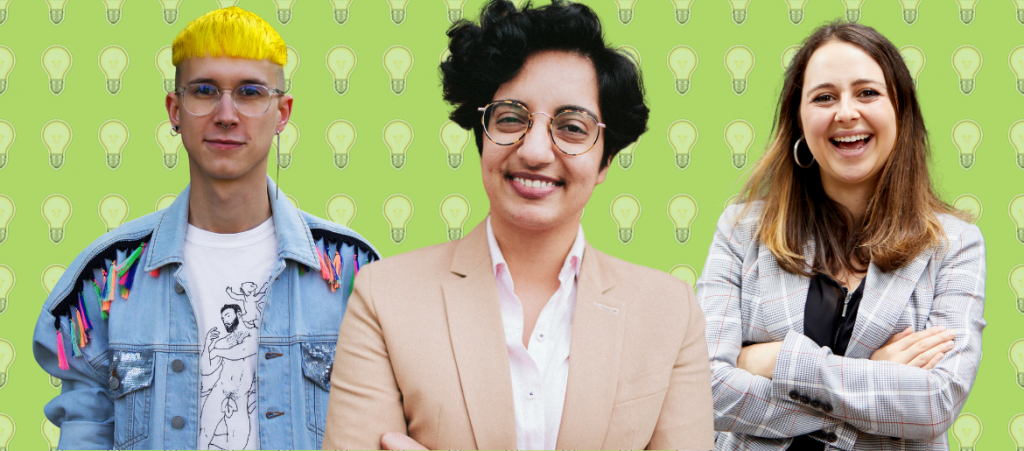
The news cycle is full of problems… but what about solutions? Welcome to IDEAS, a series where we ask experts, thinkers and insiders to share their thoughts on how to tackle the biggest challenges facing young people today, in Australia and around the world.
We’re past the halfway mark in the 2022 election campaign and tbh it’s been uninspiring. If you’ve looked at the options on offer and wondered “Is this really it?” – I don’t blame you. Australia is one of the safest, richest and most diverse countries in this world, which means we have all the ingredients to actually improve our political landscape. We can strengthen democracy, at a time when it is on the brink of collapse elsewhere.
So, despite many flaws of Australia’s political system (and politicians themselves) on show this election, we asked a range of experts an optimistic question: how do we make Australian democracy better? Their answers were, honestly, more simple and straightforward than I anticipated. Which ideas should we put in motion first?
What‘s one change we could make to the political process to improve Australian democracy?

Dr Helen Sullivan
PhD in Public Policy, Dean of ANU College of Asia & the Pacific
“Integrity, or rather the real and perceived lack of integrity in Australian politics, is a significant threat to Australian democracy. Addressing this requires multiple actions but a good place to start is to improve the transparency of donations to political parties. Donations buy access and influence for donors and their interests, and Australian voters should be much better informed about who donates, how much they donate, and to which parties.
The two major parties declared income totalling more than $150 million to the Australian Election Commission in 2020-21. Declared donations make up just 9% of this ($13.5mill). The rules governing reporting of donations obscure donor identification.
Much greater transparency is needed to illuminate the major funders of political parties, and to enable voters to judge the relationship between money and influence for themselves.”

Ashleigh Streeter-Jones
Founder of Raise Our Voice Australia
“We need better standards of media reporting. At Raise Our Voice Australia, we’ve just released a study asking young women and gender-diverse people their views on the political events of the last 12 months. One of the overwhelming themes was that media reporting is one of the main factors turning them off from participating in formal political spaces. 44 per cent of respondents said they were not likely to consider a career in politics – of this group, 61% said their feelings were influenced by the media reporting of events of the last 12 months.
The media is a really important tool for accountability in a democracy, but right now it is arguably creating a lot of negative public sentiment that is unfairly and disproportionately directed towards people from marginalized backgrounds. We’re still not comfortable with the idea of a deviation from the traditional style of leadership, and the media has a lot to answer about perpetuating those ideas with the average Australian.
We really do need to be bringing in this shift in what good leadership looks like and what a leader looks like in ‘formal’ and ‘informal’ political spaces.”

Joshua Badge
Philosopher
“I’m going to take a broad view of ‘political processes’ and say that we could improve our democracy by shortening the workweek and the workday. People disengage from politics for many reasons, but I think a common one is that people are exhausted.
It’s hard to keep up with things, even topics you care about, when you’re breaking your back working 35-40 hours a week. On top of that, you might have family commitments, study, hobbies and, you’d hope, a social life. The fact is that a lot of dodgy legislation gets passed because people are too busy to notice.
If we shortened the workweek by a day and the workday by even just two hours, we’d have much more time to rest, socialise, and engage in society. That might look like volunteering for an advocacy organisation or a political party, or just staying informed about policies and laws.”

Neha Madhok
Director of Democracy in Colour Australia
“There are plenty of things that need to change in Australian democracy, including addressing the root cause of racism. The state of Australia is one of the only former British colonies not to form a formal agreement with First Nations people. We cannot move forward until we address the atrocities of the past. We can tinker at the edges of democracy all we like, but until significant decision making power is handed back to First Nations people – whose sovereignty was never ceded – we won’t be able to meaningfully progress as a nation.”

Bill Browne
Senior Researcher, Democracy & Accountability at The Australia Institute
“Voters should go to the polls armed with the facts, but in Australia it is perfectly legal to lie in a political ad. Truth in political advertising laws would make an immediate, material difference to how election campaigns are run. These laws, which have been proven in South Australia for over thirty years, allow members of the public to take complaints about misleading advertising to a trusted, independent arbiter. If the complaint is upheld, the ad must be withdrawn or a retraction issued that corrects the record.
We take it as given that businesses break the law if they engage in misleading or deceptive conduct, so why should politicians be held to a different standard?
These laws, which have multi-party support, would improve the quality of public debate. They would not address all the problems our democracy faces, but they would make a welcome contribution.”
No ‘gotcha’ moments, no reporting on redundant press conferences, no triggering opinion pieces – Zee Feed is covering the 2022 Federal Election in a way that’s better for your brain.
Visit the Election Hub to for straightforward content to help you cast an informed vote.

Comments are closed.